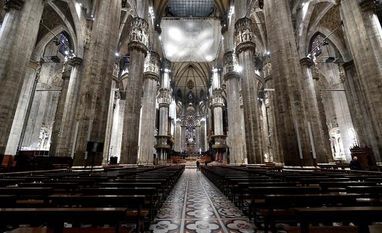In an unprecedented crackdown on the spread of Coronavirus, Italy Prime Minister Giuseppe Conte on Monday announced that the movement of 60 million across the country would be sharply restricted. With 7,300 infected in the country, Italy has reported most number of cases after China, where the virus erupted. Deaths in Milan's Lombardy alone jumped to 333, while the national death toll soared to 463, the highest in the world after China. The latest restrictions have put in place until 3 April.
World Health Organization (WHO) director-general Tedros Adhanom Ghebreyesus welcomed Italy's tough measures, noting that just four countries - China, South Korea, Italy and Iran - accounted for 93 per cent of cases worldwide.
"It would be the first pandemic that could be controlled," Tedros added. "The bottom line is we are not at the mercy of the virus."
Initially, Italy has seen only superficial compliance measures. Restrictions on movement only applied to only 11 towns in northern Italy which has a population of around 50,000 people before being expanded countrywide. Now, checkpoints have been set up at main train stations to screen travellers.
Industry captains expressed their concern about a perception being created abroad that all business was shut down and commercial deliveries of exports cannot be made. However, the civil protection body has emphasized that commercial freight is not affected by the crackdown.
So what does the lockdown of the country mean for the country's millions of citizens. Here is a brief look:
Travel curbs People will only be able to travel for work, medical reasons or emergencies until April 3.
Italians have been told to avoid all non-essential travel as quarantine measures were extended to the whole country to stop the spread of Coronavirus.
People who have tested positive for Coronavirus must not leave their homes for any reason. They need to avoid work-related travel, too. Public and private companies have been urged to put their staff on leave regarding the same.
Sporting events cancelled
The crackdown has resulted in cancellation of all sporting events including the top-rated Serie-A football league. Swimming pools, spas, sports halls and wellness centres must not operate, and ski resorts across the country are shut.
However, training for national sports events organised by international bodies, like Olympics, can be carried on without the audience.
Social gatherings
Bars and restaurants are allowed to open only between 6 am and 6 pm, while museums and cultural venues are closed. Nightclubs, cinemas, and casinos have already been closed since the weekend. Large shopping malls must close on public holidays and the day before public holidays, while supermarkets will remain open.
Under the extended restrictions, casual coffee gatherings are done away with. Customers now are required to take tables, if possible, the one furthest from the bars.
Restrictions on schools and colleges.
All schools and universities, which were closed nationwide last week until March 15, will now not reopen until next month.
More than 114,343 people have been infected by Coronavirus across the world and 4,025 have died. Italy's lockdown and oil price war have sent shockwaves across the financial markets on Monday indicating how the coronavirus is asserting itself on all aspects of social and economic life. Major European stock markets dived more than 7 per cent, Japanese indexes fell over 5 per cent and US markets sank over 7 per cent after Saudi Arabia launched an oil price war with Russia that sent investors already spooked by the coronavirus epidemic running for the exits.
Unlock 30+ premium stories daily hand-picked by our editors, across devices on browser and app.
Pick your favourite companies, get a daily email with all news updates on them.
Full access to our intuitive epaper - clip, save, share articles from any device; newspaper archives from 2006.
Preferential invites to Business Standard events.
Curated newsletters on markets, personal finance, policy & politics, start-ups, technology, and more.



)